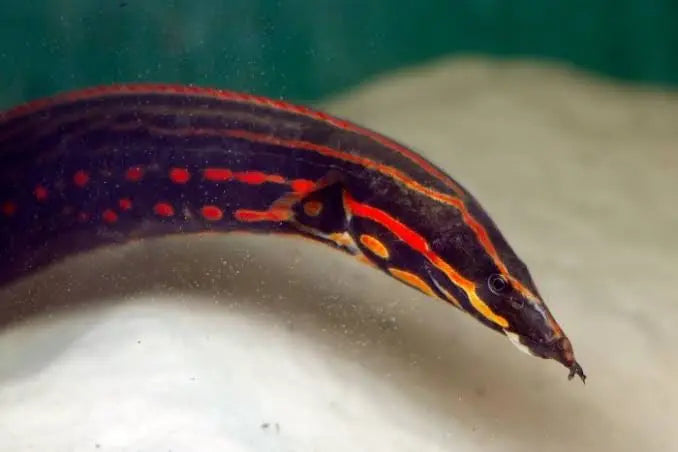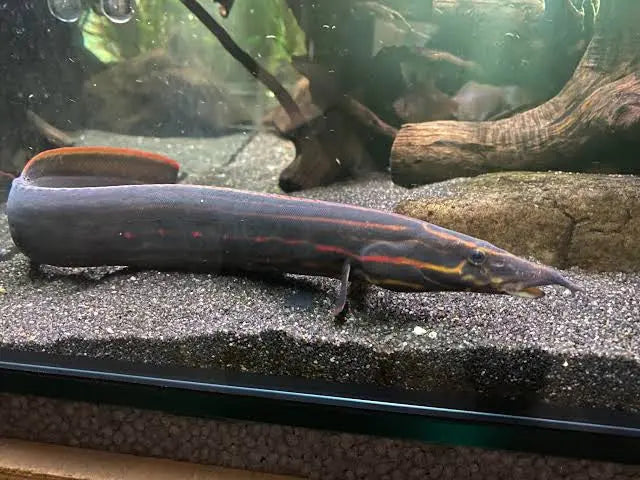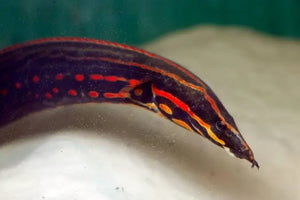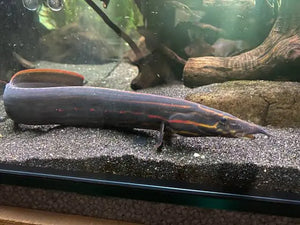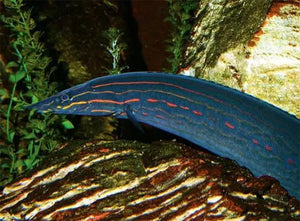Exotic Fire Eel 10-12cm Juvies Cutie
Guarantee Safe Checkout
✅The fire eel (Mastacembelus erythrotaenia) is a relatively large species of spiny eel. This omnivorous freshwater fish is native to in Southeast Asia but is also found in the aquarium trade.[1][3] Although it has declined locally (especially in parts of Cambodia and Thailand) due to overfishing, it remains common overall.[1]
✅
The fire eel is not a true eel, but an extremely elongated fish with a distinctive pointed snout and underslung mouth. It is part of spiny eels family, Mastacembelidae. The group gets its common name from the many small dorsal spines that precede the dorsal fin.
The body is laterally compressed, particularly the rear third, where it flattens as it joins the caudal fin and forms an extended tail. The fire eel's base coloring is dark brown/grey, while the belly is generally a lighter shade of the same color. Several bright red lateral stripes and spots mark the body and vary in intensity depending on the age and condition of the individual. Usually, the markings are yellow/amber in juvenile fish, changing to a deep red in larger ones. Often the anal, pectoral, and dorsal fins have a red edging.
The fire eel is the largest species in its family and can reach up to 1 m (3.3 ft) in length.
✅Fire eels occur across a relatively broad area covering a large part of lowland Southeast Asia, including central and southern Thailand, Cambodia, southern Vietnam, Peninsular Malaysia, Borneo (Brunei, Indonesia and Malaysia), and Sumatra (Indonesia).[1][3] They inhabit slow-moving rivers and flood plains, and are bottom-dwellers that typically are found in places with a muddy bottom.[1][3] They spend large portions of their time buried in the riverbed, often leaving only their snout visible.
The fire eel feeds on invertebrates (such as insect larvae, worms, and crustaceans), smaller fish, plant matter, and detritus.[3][5] In captivity, they only rarely eat plant matter.[5]
✅Tank Size
The minimum recommended tank size for these fish is around 300 liter tank. The size of these fish and their activity level means they need ample room so they can swim and feel comfortable.
Water Parameters
Fire Eel are pretty hardy and can survive in a fairly wide range of water parameters. With that being said, there is a recommended window that you should aim for if you want them to be as healthy as possible.
- Water temperature: 24- 28°C
- pH levels: 6.2 to 7.8
- Water hardness: Soft
- KH: 5-20 dKH
- Substrate : Soft Sand
- MUST TO HAVE LID
ENVIRONMENT :
Dark water , driftwood , plants and low light .
Limited Quantity Available - Will Sell out Fast!
Note:
We can’t ship Livestock and Live Plants to WA and TAS due to State Restrictions. Kindly check out our DOA and other policies before purchase!!
What to Expect from Us
All Aquatic plants and animals come with a 100% live arrival guarantee!!

| Size |
1 Cutie fire eel 10-12cm |
|---|

